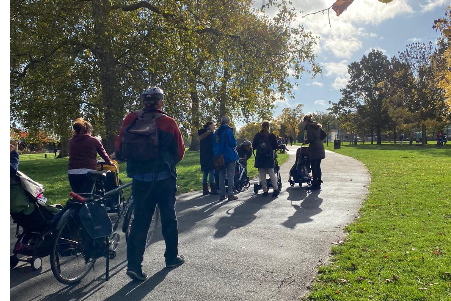
Walking for local integration supports fitness, health, integration and inclusivity for socially isolated migrant families and adults. The project offers community-based walks focused around a different theme or activity that are held throughout the year.
These walks help to support groups to enjoy walking as part of getting to know their local areas, community members and local service providers.
Example themed spaces include, parks and woodlands, river and canal paths, estates and managed gardens, but they can take place anywhere.
The project recruits a team of volunteers to receive further training so they can help to run the walks and encourage more people to get involved. The volunteer training programme develops volunteers’ skills, interests and local knowledge and empowers them to share them with socially isolated migrant families and adults.
Resources can also be developed to support walks such as local maps, highlighting landmarks associated with that week’s theme, and ‘Spot the’ sheets for young people and families. Pedometers could also be provided as an incentive to trial walking more.
Key benefits of the project for participants are:
- Experiencing the pleasure of a walk rather than walking as a means of getting from A to B
- Meeting and interacting with other local families/adults
- Developing language skills and local knowledge
- Developing confidence to walk independently around the local area
- Getting information on useful apps and websites to help plan more independent walking such as TfL Go, Citymapper
- Finding out about local services, support and recreational opportunities
- Improved mental wellbeing and health
- Reduced social isolation
If targeting participants from a diverse ethnic background, staff and volunteers should be used who can speak participants’ appropriate languages. The project idea can then demonstrate that residents from different faiths and ethnic backgrounds can integrate and exercise together. English speaking practice could also be built into the walks or rest breaks.
Target audience and engagement
- The key target audience is migrant families and adults
- Promote your project by hosting or attending events and using publicity materials, such as leaflets or posters
- Use existing networks with community groups, or seek out specialist asylum seekers and charity organisations, to raise awareness of your activities
- Engagement can also be through social media, with specific targeting to potential user groups
- Word of mouth, this is especially effective for the older groups
Reach
- Medium to large (70-90 participants)
- Geographically - anywhere there are green, open spaces, footpaths and walkways
Equipment needed
- Walk resources, including comfortable shoes, local maps and work sheets
- Water bottles
- Pedometers
Resources needed
- Project Leader:
-Oversee the project ensuring the participants feel safe and enjoy their experience
-Track equipment and make sure it is returned
-Ensure all funding criteria and documentation is met (if required)
-Run risk assessment for safeguarding, injuries and identify any other concerns which may affect project delivery
-Gather feedback from participants
-The project lead should have the requisite level of DBS, understand health and safety needs and preferably be first aid trained (DBS checks can be funded through the grant) - Volunteers/Project Officers:
-Help answer queries
-Contribute to overseeing activity and potentially fix any equipment issues
-Run the scheduled walks - Storage Space:
-You will need somewhere to store equipment. This could be at a community centre, in an existing office, or perhaps another local business that has a storage facility - Publicity:
-Flyers and posters for publicity of the sessions - Refreshments:
-Tea, coffee and snacks at sessions - this will lighten the mood and offers an incentive for people to come. You can also stop off for refreshments at cafés along the walking route, or bring your own as part of a picnic event built into the walk plan
Estimated project costs
- Volunteer Trainer £2,000
- Volunteer Support £350
- Project Publicity £50
- Resources for walks £200
- Water bottles £60
- Pedometers £120
- Hi-Vis vests £40
- Volunteer travel expenses £60
- Refreshments £40
- Project Manager and administrator £1,200
- Public liability insurance (if needed) £170
Top tips/key learnings
- Try to recruit committed and enthusiastic volunteers who speak different languages; this will really help to make the project a success and engage participants
- Be prepared for the unexpected and be willing to be flexible in the delivery of your programme. This may include having a plan to cut walks short if they are taking longer than anticipated due to participants’ abilities
- Be aware of the limitations of your budget and ensure that you plan your spending carefully to ensure you can work within your allocated funds
- Inviting expressions of interest and then following up with specific walk information can be labour intensive. Plan the walks in advance and advertise them at specific times for people to sign up to
- Simple activities such as feeding ducks can be very popular
- The project can provide opportunities to train an experienced tutor to run volunteer training
- Take advantage of the training programme that is offered by Walking and Cycling Grants London
Maximising local contacts
- Utilise networks to recruit participants or even get in-kind support (volunteer organisations and local centres, community centres etc.)
- Engage with your local council - they may be able to lend you equipment, help market the project, or help secure a local space for meetings
- You might find that a local shop is willing to provide water and snacks, or that a local café is happy for you to direct participants to them for toilet facilities
This project idea was provided by Learning Unlimited - Twitter - Facebook
If you decide to run your own version of this project in your community, please email us at wcgl@groundwork.org.uk. We love to hear that we are inspiring people to walk and cycle.